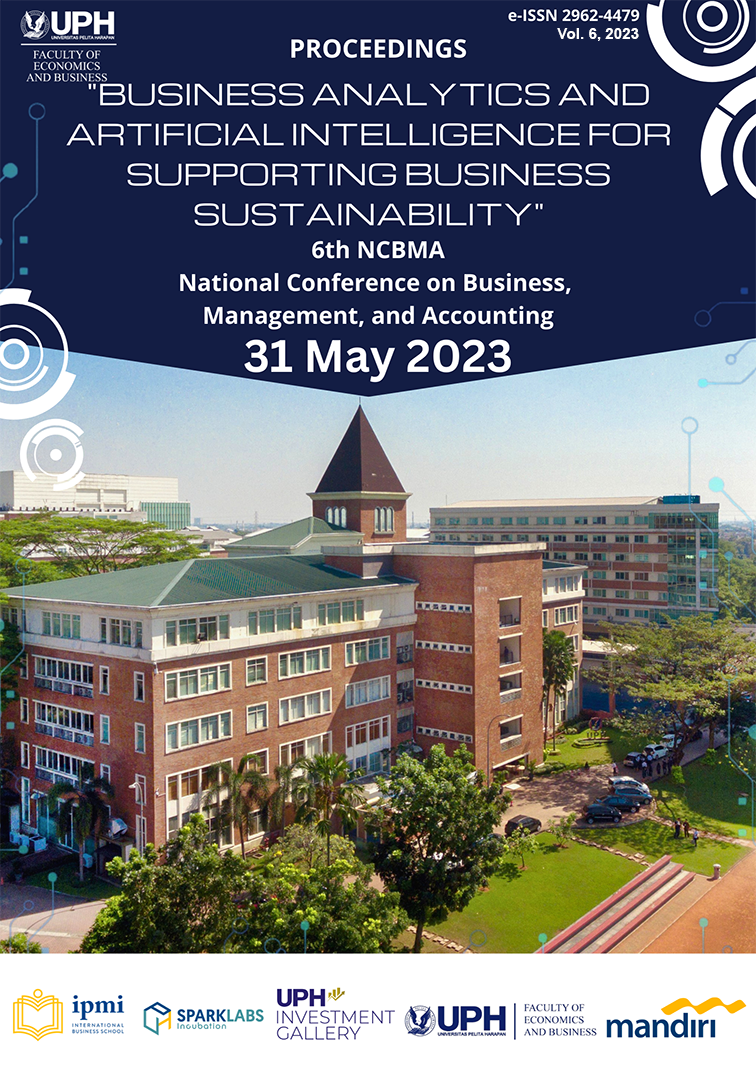CORPORATE SOCIAL RESPONSIBILITY, INTELLECTUAL CAPITAL, DAN KINERJA KEUANGAN: EKSPLORASI MODEL
Keywords:
Corporate social responsibility, intellectual capital, kinerja keuanganAbstract
This study aims to explore a model based on the following research questions: (1) Does corporate social responsibility/CSR affect financial performance? (2) Does corporate social responsibility affect intellectual capita/ICl? (3) Does intellectual capital affect financial performance? (4) Does corporate social responsibility affect financial performance through intellectual capital. CSR has a positive influence on financial performance. Based on the four propositions put forward, the following conclusions are obtained. CSR activity is the first step to identify the impact of corporate sustainability in creating better business opportunities. By increasing CSR activities carried out by the company, it will improve the performance produced by IC and produce effective and efficient company internal processes with the implementation of governance and management systems based on sustainability. The company carries out CSR activities with the aim of improving financial performance and making CSR a component in the formulation of corporate strategy that aims to increase the company's internal resources or intellectual capital on an ongoing basis.
References
Aggarwal, P. (2013). 1-s2.0-S1877042815054580-main. Global Journal of Management and Business Research Finance, 13(11), 61-70.
Bonini, S., & Swartz, S. (2014). Profits with purpose: How organizing for sustainability can benefit the bottom line. McKinsey on Sustainability & Resource Productivity, 1-15. Retrieved from http://www.mckinsey.com/business-functions/sustainability-and-resource-productivity/our-insights/profits-with-purpose-how-organizing-for-sustainability-can-benefit-the-bottom-line
Chaston, I. (2015). Resource-Based View (RBV). Wiley Encyclopedia of Management. https://doi.org/10.1002/9781118785317.weom090219
Dastane, O., & Value, C. P. (2017). Sustainability Practices as Determinants of Financial Performance : A Case of Malaysian Corporations Sustainability Practices as Determinants of Financial Performance : A Case of Malaysian Corporations, (June). https://doi.org/10.13106/jafeb.2017.vol4.no2.55
Demartini, P., Cesaroni, F. M., Paoloni, P., & Derl Baldo, M. (2017). Intellectual Capital and Financial Performance. Evidences From Italian Firms. Global Business and Economics Review, 19(4), 1. https://doi.org/10.1504/GBER.2017.10003413
Dženopoljac, V., Janoševic, S., & Bontis, N. (2016). Intellectual capital and financial performance in the Serbian ICT industry. Journal of Intellectual Capital, 17(2), 373-396. https://doi.org/10.1108/JIC-07-2015-0068
Freeman, R. E. (2010). Strategic Management: A Stakeholder Approach. Cambridge University Press.
Holienka, M., & Pilková, A. (2014). Impact of intellectual capital and its components on firm performance before and after crisis. Electronic Journal of Knowledge Management, 12(4), 261-272.
Ismiyanti, F., Hamidya, A. R., Ekonomi, F., & Airlangga, U. (2017). Pengaruh Struktur Kepemilikan Terhadap Kinerja Dengan Value Added Intellectual Capital Coefficient ( Vaic Tm ) Sebagai Variabel Intervening Recursive Regression karena variabel persamaan, 12(1).
Jaffeer, R. (2011). Environmental Performance and Sustainable Development. Journal of Sustainable Development, 4(6), 181-188. https://doi.org/10.5539/jsd.v4n6p181
Joshi, M., Cahill, D., Sidhu, J., & Kansal, M. (2013). Intellectual capital and financial performance: an evaluation of the Australian financial sector. Journal of Intellectual Capital, 14(2), 264-285. https://doi.org/10.1108/14691931311323887
Kamath, G. B. (2015). Impact of Intellectual Capital on Financial Performance and Market Valuation of Firms in India. International Letters of Social and Humanistic Sciences, 48(1997), 107-122. https://doi.org/10.18052/www.scipress.com/ILSHS.48.107
Lin, C.-S., Chang, R.-Y., & Dang, V. (2015). An Integrated Model to Explain How Corporate Social Responsibility Affects Corporate Financial Performance. Sustainability, 7(7), 8292-8311. https://doi.org/10.3390/su7078292
Luthan, E., & Yohana, D. (2016). A Correlation of CSR and Intellectual Capital , its Implication toward Company ’ s Value Creation, 5(11), 88-94.
Mitroff, I. (1983). Stakeholders of the organizational mind. San Fransisco.
Surroca, J., Tribó, J. A., & Waddock, S. (2010). Corporate responsibility and financial performance: The role of intangible resources. Strategic Management Journal, 31(5), 463-490. https://doi.org/10.1002/smj.820
Tang, Z., Hull, C. E., & Rothenberg, S. (2012). How Corporate Social Responsibility Engagement Strategy Moderates the CSR-Financial Performance Relationship. Journal of Management Studies, 49(7), 1274-1303. https://doi.org/10.1111/j.1467-6486.2012.01068.x

